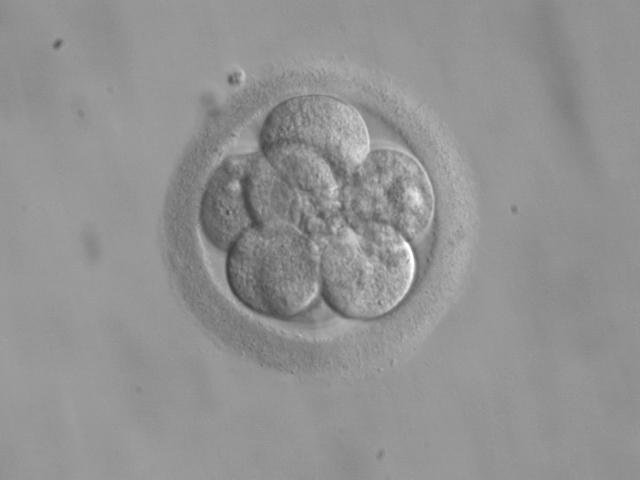Human embryo with eight cells, three days after fertilization. (PD/Ekem/RWJMS IVF)
Britain could become the first country in the world to offer "three-parent" in vitro fertilization (IVF) to help families with mitochondrial diseases -- conditions passed through the maternal line that affect roughly one in 6,500 children worldwide.
"Scientists have developed ground-breaking new procedures which could stop these diseases being passed on, bringing hope to many families seeking to prevent their children inheriting them," Sally Davies, England's chief medical officer, told reporters Friday.
A British medical ethics panel which reviewed the potential treatments for mitochondrial diseases decided last year they were ethical and should go ahead as long as research shows they are likely to be safe and effective.
The potential treatment is known as three-parent IVF because the offspring would have genes from a mother, a father and from a female donor. The donor DNA in the mitochondria would be much less than the parental DNA in the nucleus, which determines the baby's characteristics.
After public consultations showed citizens broadly favor the idea, the government's chief physician said on Friday it should be allowed to go ahead under strict regulation.
The UK government plans to consider draft regulations on the fertility treatment later this year, aiming to put the measure before parliament next year. At the moment, only unaltered eggs and embryos can be used for IVF.
Some have already criticized the research, saying that creating embryonic children in a lab abuses them by subjecting them to unnatural processes.
Dr. David King, director of Human Genetic Alert, a London-based watchdog group, opposed use of the technique Friday saying it's the first step towards the creation of "designer babies," whose genetic makeup could be modified for cosmetic traits.
"It is a disaster that the decision to cross the line that will eventually lead to a eugenic designer baby market should be taken on the basis of an utterly biased and inadequate consultation," King said, referring to the survey used to determine public support.
Though treatments and their potential regulations would have to go through parliament, Davies says she hopes the first families will receive the donor IVF treatments within two years. "It's only right that we look to introduce this life-saving treatment as soon as we can," she said.















